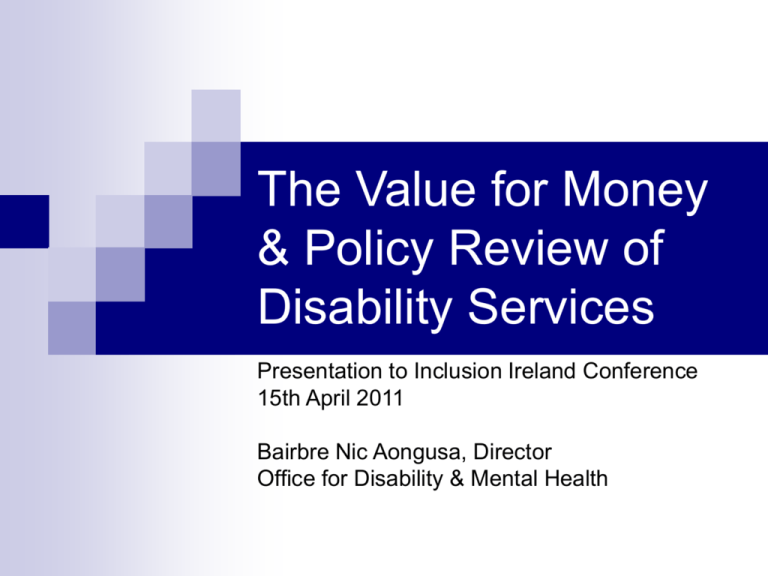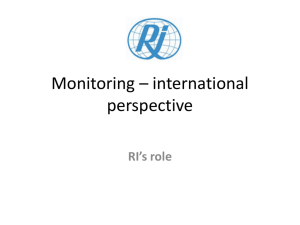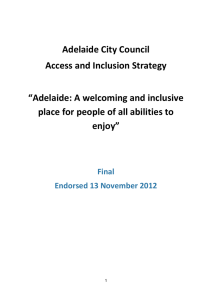her presentation
advertisement

The Value for Money & Policy Review of Disability Services Presentation to Inclusion Ireland Conference 15th April 2011 Bairbre Nic Aongusa, Director Office for Disability & Mental Health Overview Role of the Office for Disability & Mental Health VFM & Policy Review – Terms of Reference What are our policy objectives? What service users are saying Key themes emerging Government programme Implementation challenges Office for Disability & Mental Health Based in Department of Health Health aspects of National Disability Strategy and Health sectoral plan commitments Cross-sectoral remit in relation to disability & mental health Education Employment Housing Children VFM & Policy Review – Terms of Reference Identify the objectives - are they still valid? Examine current outputs and outcomes (effectiveness) Level and trend of costs and staffing resources over the years (efficiency) Scope for reducing overheads Scope for alternative policy or organisational approaches Objective 1: To support every person with a disability to enable them, to the greatest extent possible, to lead full and independent lives, to participate in work and society and to maximise their potential; Objective 2: To ensure that every person with a disability would have access to public spaces, buildings, transport, information, advocacy and other public services and appropriate housing; Objective 3: To ensure that every person with a disability would, consistent with their needs and abilities, have access to appropriate health, education, employment and training and personal social services. Objective 4: To support and acknowledge the role of carers. Over 16,000 people with disabilities attend a day setting, with over 90% attending segregated, group settings Over 9,000 people with intellectual disabilities in residential settings, 90% in segregated, group settings Current needs assessment methods (for the two databases) identify continuing demand for residential and day places Little acknowledgement of role of carers Flexible supports to suit individual needs “...use local services – do ordinary things in ordinary places” Families of service users want to be allowed to play their part in supporting their family member Get different elements of service from different providers Get a budget to choose and manage their own services Dissatisfied with the amount of independence they have Dissatisfied with the amount of choice they have over the service received from service providers Dissatisfied with support received from service providers to facilitate inclusion in the mainstream life of the community Key themes emerging (published 3rd December 2010) More access to mainstream services; Personal supports to facilitate inclusion delivered separately from health and clinical supports; Individualised funding so that service users can exercise choice and control; More involvement of family and friends (natural supports, informal supports); Tighter governance, ensuring funding is clearly linked to needs and outcomes. Government for National Recovery 2011-2016 (p. 54) “We will reform the delivery of public services to bring about back office savings that will protect front line services” “A comprehensive spending review will examine all provision for people with disability with a view to determining how users can get the best services.” “As part of this Review we will move a proportion of public spending to a personal budget model so that people with disabilities or their families have the flexibility to make choices that suit their needs best.” Implementation challenges Standardised assessment of need to determine individualised budgets (who? how?) May need legislative and administrative changes New role for existing service providers? Role of other sectors in achieving mainstreaming agenda – employment, housing, income support, education, transport etc. Challenge for HSE and health system







